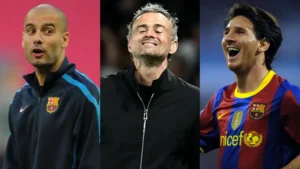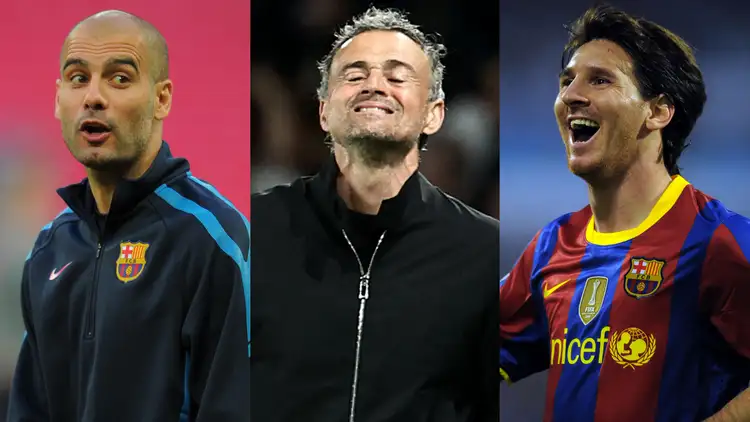Luis Enrique Sparks Debate Over Barcelona ‘DNA’: Only Cruyff, Guardiola, and Messi Recognized
In the world of football, few terms are as revered and debated as the concept of “Barcelona DNA.” The term embodies the essence of FC Barcelona’s philosophy—rooted in possession-based, attacking football, shaped by visionaries like Johan Cruyff, and later perfected by Pep Guardiola. Recently, this storied concept has come under scrutiny following a comment by Paris Saint-Germain’s (PSG) coach Luis Enrique, who once held the reins at Barcelona.

Luis Enrique, a successful manager in his own right, having led Barcelona to numerous trophies, including the coveted UEFA Champions League title, made a remark that some perceived as a deviation from the traditional Barcelona ethos. This has led to widespread discussions and, notably, a pointed comment suggesting that only three individuals truly embody the “Barcelona DNA”: Johan Cruyff, Pep Guardiola, and Lionel Messi.
### The Foundations of Barcelona DNA
The “Barcelona DNA” is more than just a style of play; it’s a cultural and philosophical identity that has been cultivated over decades. Johan Cruyff, both as a player and a coach, laid the foundation for this identity. His vision of “Total Football,” which he brought to Barcelona, emphasized fluidity, ball control, and a relentless attacking mindset. This philosophy not only brought success but also transformed the way football was played at Barcelona, making it synonymous with beautiful, effective football.
Pep Guardiola, a protégé of Cruyff, took this foundation and elevated it to unprecedented heights. Under his management, Barcelona became a global phenomenon, winning multiple La Liga titles and two Champions League trophies in a span of just four years. Guardiola’s Barcelona was the epitome of the “Barcelona DNA”—a team that played with precision, creativity, and dominance, largely revolving around a diminutive Argentine forward who would go on to become the club’s greatest player.
### Lionel Messi: The Embodiment of Barcelona’s Legacy
Lionel Messi, widely regarded as one of the greatest footballers of all time, is seen as the living embodiment of the “Barcelona DNA.” Having spent his entire professional career at Barcelona until his move to PSG in 2021, Messi’s playstyle, vision, and loyalty to the club have made him an icon not just at Barcelona, but in the world of football.
Messi’s ability to dictate the tempo, his dribbling, and his knack for creating something out of nothing on the pitch perfectly encapsulated the ideals that Cruyff and Guardiola had ingrained into the club. For many fans and pundits alike, Messi is the ultimate product of Barcelona’s philosophy—a philosophy that prioritizes skill, intelligence, and a deep understanding of the game.
### The Debate over Luis Enrique’s Comments
Luis Enrique’s tenure at Barcelona was marked by significant success, but his recent comments have sparked a debate about what it truly means to embody the “Barcelona DNA.” The notion that only Cruyff, Guardiola, and Messi can be said to have this DNA suggests a very narrow and perhaps exclusive view of what defines Barcelona’s identity.

Critics argue that while Luis Enrique achieved great things at the club, his style and approach sometimes diverged from the purest interpretations of Barcelona’s footballing philosophy. His time at the club was characterized by a more pragmatic approach, blending possession football with rapid transitions, which some purists believe diluted the traditional “Barcelona DNA.”
### Conclusion
The conversation around Barcelona’s identity and who truly represents it is ongoing. While Johan Cruyff, Pep Guardiola, and Lionel Messi are undoubtedly the pillars of this legacy, the debate over whether others, like Luis Enrique, can lay claim to this DNA highlights the complexities of defining a club’s identity. As football evolves, so too does the interpretation of what it means to carry the “Barcelona DNA,” ensuring that this discussion remains lively and relevant in the years to come.

